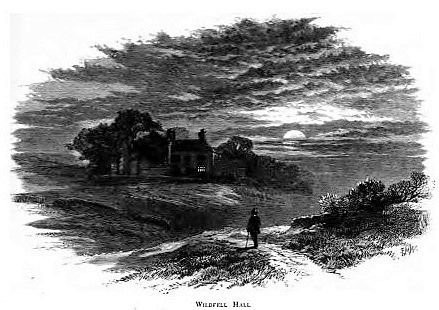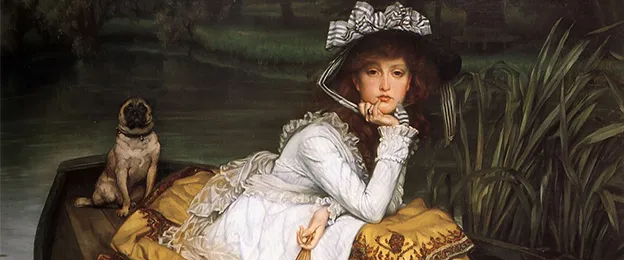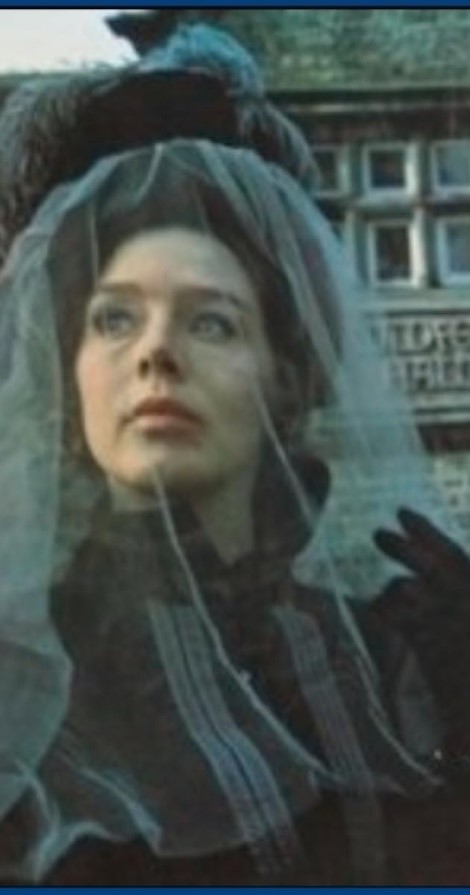
Anne Brontë’s second and final novel, under the pen name Acton Bell, considered to be the most shocking of all the Brontë Sisters’ novels, was an instant success when published in 1848, but after Anne’s death her sister Charlotte suppressed its publication. It is now considered to be one of the first feminist novels, as the female protagonist violates both social conventions and 19th-century English law in leaving her husband and making her own way in life – without a man.
When a mysterious young widow, calling herself Helen Graham, arrives at Wildfell Hall, a desolate Elizabethan mansion empty for many years, she strikes a peculiar figure: secretive, mysterious, fiercely independent (pursuing a career as an artist); soon her strict seclusion starts some pretty nasty gossip in the village resulting in her becoming a social outcast, thereby completing her transformation into the perfect romantic heroine.
However, it is her backstory, given to the novel’s hero – Gilbert Markham – and the reader, in a pretty hefty volume of her diary, that makes this something far more than a gothic romance. We are told the story of her ill-advised marriage and her husband’s subsequent physical and moral decline through alcohol and debauchery. The immoral aristocratic milieu is offered to us as the gothic darkness at the heart of this novel, turning it into a properly morally didactic Victorian tale: Anne Bronte takes the silliness of the fiction of her youth, and turns it to good use – exposing the flaw running through novels such as Austen’s – the happy ending of marriage is very often anything but.
This is primarily a novel depicting marital strife and a common women’s fate: to lose all power, agency and self-respect just as soon as she ties herself to the wrong man – and there are a lot of ‘wrong men’, or wrong’uns (not all men) in this novel, the fate of whom is instructive, if you’re paying attention.
May Sinclair, in 1913, said that “the slamming of [Helen’s] bedroom door against her husband reverberated throughout Victorian England”.
The Rogues Gallery of “Wrong’uns”

Arthur Huntingdon, Helen’s abusive and alcoholic husband, is a bit of a comic book villain, as well as a Byronic figure, with rather gross moral failings, as predicted by the glint on his eye from early on. His fate is sealed in a novel such as this: surely such characters cannot survive, let along thrive. Unless he sees the error of his ways, and repents? But there doesn’t seem to be space for such a turn of events in a novel such as this. Likley to have been modelled on Anne’s dissolute, feckless and immoral (alcoholic) brother Branwell.

Annabella Wilmot, later Lady Lowborough: flirtatious, bold and exquisitely beautiful – all clear markers of ‘wrong’unness’. Has an affair with Arthur Huntingdon for several years. When Annabella’s husband discovers it, he obtains a divorce.
“Lady Lowborough eloped with another gallant to the Continent, where, having lived a while in reckless gaiety and dissipation, they quarrelled and parted. She went dashing on for a season, but years came and money went: she sunk, at length, in difficulty and debt, disgrace and misery; and died at last, as I have heard, in penury, neglect, and utter wretchedness. But this might be only a report: she may be living yet for anything I or any of her relatives or former acquaintances can tell; for they have all lost sight of her long years ago, and would as thoroughly forget her if they could.”

Lord Lowborough: Annabella’s husband, is melancholic, dour, gloomy, apathetic but devoted – and so shouldn’t come to too much harm in the end. A reformed character for most of the story – he used to gamble and drink too much and was addicted to opium, but, after a bit of financial ruin, reforms himself. He’s a true character: he truly loves Annabella, and her infidelity brings him such suffering that only his Christian faith keeps him going.
“The second object of his choice was widely different from the first. Some wondered at his taste; some even ridiculed it—but in this their folly was more apparent than his. The lady was about his own age—i.e., between thirty and forty—remarkable neither for beauty, nor wealth, nor brilliant accomplishments; nor any other thing that I ever heard of, except genuine good sense, unswerving integrity, active piety, warm-hearted benevolence, and a fund of cheerful spirits. These qualities, however, as you may readily imagine, combined to render her an excellent mother to the children, and an invaluable wife to his lordship.”
Ralph Hattersley, a friend of Huntingdon’s, marries Milicent because he wants a quiet wife who will let him do what he likes
Milicent Hargrave, a meek woman married to Ralph Hattersley against her will, is Walter’s sister and Helen’s close friend. Milicent can be seen as a foil to her. If Helen is spirited and forthright, unafraid to speak to the men in her life with frankness, Milicent, in contrast, is trampled and ignored by her husband.

Esther Hargrave, the younger sister of Milicent and Walter, and Helen’s friend, is bold, high-spirited and independent. She resists an arranged marriage her family tries to force her into and eventually marries Helen’s brother, Frederick Lawrence.
“Well, Esther, I pity you; but still, I repeat, stand firm. You might as well sell yourself to slavery at once, as marry a man you dislike. If your mother and brother are unkind to you, you may leave them, but remember you are bound to your husband for life.”
“But I cannot leave them unless I get married, and I cannot get married if nobody sees me. I saw one or two gentlemen in London that I might have liked, but they were younger sons, and mamma would not let me get to know them—one especially, who I believe rather liked me—but she threw every possible obstacle in the way of our better acquaintance. Wasn’t it provoking?”
“I have no doubt you would feel it so, but it is possible that if you married him, you might have more reason to regret it hereafter than if you married Mr. Oldfield. When I tell you not to marry without love, I do not advise you to marry for love alone: there are many, many other things to be considered. Keep both heart and hand in your own possession, till you see good reason to part with them; and if such an occasion should never present itself, comfort your mind with this reflection, that though in single life your joys may not be very many, your sorrows, at least, will not be more than you can bear. Marriage may change your circumstances for the better, but, in my private opinion, it is far more likely to produce a contrary result.”
“So thinks Milicent; but allow me to say I think otherwise. If I thought myself doomed to old-maidenhood, I should cease to value my life. The thoughts of living on, year after year, at the Grove—a hanger-on upon mamma and Walter, a mere cumberer of the ground (now that I know in what light they would regard it), is perfectly intolerable; I would rather run away with the butler.”
Jane Wilson, a friend of Eliza Millward and a scandalmonger, tries to ensnare Frederick Lawrence, but when Gilbert reveals to him her hatred of Frederick’s sister Helen, Frederick breaks off their relationship. As no man she meets fits her high standards, she moves to a nearby country town, constantly name dropping, but friendless and, according to Helen, becomes a bitter spinster.
“As for Richard Wilson’s sister, she, having been wholly unable to recapture Mr. Lawrence, or obtain any partner rich and elegant enough to suit her ideas of what the husband of Jane Wilson ought to be, is yet in single blessedness. Shortly after the death of her mother she withdrew the light of her presence from Ryecote Farm, finding it impossible any longer to endure the rough manners and unsophisticated habits of her honest brother Robert and his worthy wife, or the idea of being identified with such vulgar people in the eyes of the world, and took lodgings in —— the county town, where she lived, and still lives, I suppose, in a kind of close-fisted, cold, uncomfortable gentility, doing no good to others, and but little to herself; spending her days in fancy-work and scandal; referring frequently to her “brother the vicar,” and her “sister, the vicar’s lady,” but never to her brother the farmer and her sister the farmer’s wife; seeing as much company as she can without too much expense, but loving no one and beloved by none—a cold-hearted, supercilious, keenly, insidiously censorious old maid.”
Eliza Millward, daughter of the vicar and friend of Jane Wilson, is a scandalmonger. Gilbert carries on a half-serious flirtation with her before he first meets Helen.
Mary Millward, Eliza’s elder sister, is a plain, quiet, sensible girl, housekeeper and family drudge. She is trusted and valued by her father, loved and courted by children and poor people, dogs and cats, and slighted and neglected by everybody else.

Walter Hargrave, a friend of Arthur Huntingdon’s, is a predatory admirer of Helen while she is still living with her husband. He is a cousin of Annabella Wilmot.
“It will be four years next April since I first saw you, Mrs. Huntingdon—you may have forgotten the circumstance, but I never can. I admired you then most deeply, but I dared not love you. In the following autumn I saw so much of your perfections that I could not fail to love you, though I dared not show it. For upwards of three years I have endured a perfect martyrdom. From the anguish of suppressed emotions, intense and fruitless longings, silent sorrow, crushed hopes, and trampled affections, I have suffered more than I can tell, or you imagine—and you were the cause of it, and not altogether the innocent cause. My youth is wasting away; my prospects are darkened; my life is a desolate blank; I have no rest day or night: I am become a burden to myself and others, and you might save me by a word—a glance, and will not do it—is this right?”
Chapter 23 – First Weeks of Matrimony
“I am married now, and settled down as Mrs. Huntingdon of Grassdale Manor. I have had eight weeks’ experience of matrimony. And do I regret the step I have taken? No, though I must confess, in my secret heart, that Arthur is not what I thought him at first, and if I had known him in the beginning as thoroughly as I do now, I probably never should have loved him, and if I loved him first, and then made the discovery, I fear I should have thought it my duty not to have married him. To be sure I might have known him, for every one was willing enough to tell me about him, and he himself was no accomplished hypocrite, but I was wilfully blind; and now, instead of regretting that I did not discern his full character before I was indissolubly bound to him, I am glad, for it has saved me a great deal of battling with my conscience, and a great deal of consequent trouble and pain; and, whatever I ought to have done, my duty now is plainly to love him and to cleave to him, and this just tallies with my inclination.
He is very fond of me, almost too fond. I could do with less caressing and more rationality. I should like to be less of a pet and more of a friend, if I might choose; but I won’t complain of that: I am only afraid his affection loses in depth where it gains in ardour. I sometimes liken it to a fire of dry twigs and branches compared with one of solid coal, very bright and hot; but if it should burn itself out and leave nothing but ashes behind, what shall I do? But it won’t, it shan’t, I am determined; and surely I have power to keep it alive. So let me dismiss that thought at once. But Arthur is selfish; I am constrained to acknowledge that; and, indeed, the admission gives me less pain than might be expected, for, since I love him so much, I can easily forgive him for loving himself: he likes to be pleased, and it is my delight to please him; and when I regret this tendency of his, it is for his own sake, not for mine.”

Chapter 32 – The Problem of Girls – for mothers
Esther Hargrave is getting a fine girl. She is not out of the school-room yet, but her mother frequently brings her over to call in the mornings when the gentlemen are out, and sometimes she spends an hour or two in company with her sister and me, and the children; and when we go to the Grove, I always contrive to see her, and talk more to her than to any one else, for I am very much attached to my little friend, and so is she to me. I wonder what she can see to like in me though, for I am no longer the happy, lively girl I used to be; but she has no other society, save that of her uncongenial mother, and her governess (as artificial and conventional a person as that prudent mother could procure to rectify the pupil’s natural qualities), and, now and then, her subdued, quiet sister. I often wonder what will be her lot in life, and so does she; but her speculations on the future are full of buoyant hope; so were mine once. I shudder to think of her being awakened, like me, to a sense of their delusive vanity. It seems as if I should feel her disappointment, even more deeply than my own. I feel almost as if I were born for such a fate, but she is so joyous and fresh, so light of heart and free of spirit, and so guileless and unsuspecting too. Oh, it would be cruel to make her feel as I feel now, and know what I have known!
Her sister trembles for her too. Yesterday morning, one of October’s brightest, loveliest days, Milicent and I were in the garden enjoying a brief half-hour together with our children, while Annabella was lying on the drawing-room sofa, deep in the last new novel. We had been romping with the little creatures, almost as merry and wild as themselves, and now paused in the shade of the tall copper beech, to recover breath and rectify our hair, disordered by the rough play and the frolicsome breeze, while they toddled together along the broad, sunny walk; my Arthur supporting the feebler steps of her little Helen, and sagaciously pointing out to her the brightest beauties of the border as they passed, with semi-articulate prattle, that did as well for her as any other mode of discourse. From laughing at the pretty sight, we began to talk of the children’s future life; and that made us thoughtful. We both relapsed into silent musing as we slowly proceeded up the walk; and I suppose Milicent, by a train of associations, was led to think of her sister.
“Helen,” said she, “you often see Esther, don’t you?”
“Not very often.”
“But you have more frequent opportunities of meeting her than I have; and she loves you, I know, and reverences you too: there is nobody’s opinion she thinks so much of; and she says you have more sense than mamma.”
“That is because she is self-willed, and my opinions more generally coincide with her own than your mamma’s. But what then, Milicent?”
“Well, since you have so much influence with her, I wish you would seriously impress it upon her, never, on any account, or for anybody’s persuasion, to marry for the sake of money, or rank, or establishment, or any earthly thing, but true affection and well-grounded esteem.”
“There is no necessity for that,” said I, “for we have had some discourse on that subject already, and I assure you her ideas of love and matrimony are as romantic as any one could desire.”
“But romantic notions will not do: I want her to have true notions.”
“Very right: but in my judgment, what the world stigmatises as romantic, is often more nearly allied to the truth than is commonly supposed; for, if the generous ideas of youth are too often over-clouded by the sordid views of after-life, that scarcely proves them to be false.”
Chapter 33 – Helen discovers the truth of husband’s infidelity
“God help me now!” I murmured, sinking on my knees among the damp weeds and brushwood that surrounded me, and looking up at the moonlit sky, through the scant foliage above. It seemed all dim and quivering now to my darkened sight. My burning, bursting heart strove to pour forth its agony to God, but could not frame its anguish into prayer; until a gust of wind swept over me, which, while it scattered the dead leaves, like blighted hopes, around, cooled my forehead, and seemed a little to revive my sinking frame. Then, while I lifted up my soul in speechless, earnest supplication, some heavenly influence seemed to strengthen me within: I breathed more freely; my vision cleared; I saw distinctly the pure moon shining on, and the light clouds skimming the clear, dark sky; and then I saw the eternal stars twinkling down upon me; I knew their God was mine, and He was strong to save and swift to hear. “I will never leave thee, nor forsake thee,” seemed whispered from above their myriad orbs. No, no; I felt He would not leave me comfortless: in spite of earth and hell I should have strength for all my trials, and win a glorious rest at last!
Refreshed, invigorated, if not composed, I rose and returned to the house. Much of my new-born strength and courage forsook me, I confess, as I entered it, and shut out the fresh wind and the glorious sky: everything I saw and heard seemed to sicken my heart—the hall, the lamp, the staircase, the doors of the different apartments, the social sound of talk and laughter from the drawing-room. How could I bear my future life! In this house, among those people—oh, how could I endure to live! John just then entered the hall, and seeing me, told me he had been sent in search of me, adding that he had taken in the tea, and master wished to know if I were coming.
“Ask Mrs. Hattersley to be so kind as to make the tea, John,” said I. “Say I am not well to-night, and wish to be excused.”
I retired into the large, empty dining-room, where all was silence and darkness, but for the soft sighing of the wind without, and the faint gleam of moonlight that pierced the blinds and curtains; and there I walked rapidly up and down, thinking of my bitter thoughts alone. How different was this from the evening of yesterday! That, it seems, was the last expiring flash of my life’s happiness. Poor, blinded fool that I was to be so happy! I could now see the reason of Arthur’s strange reception of me in the shrubbery; the burst of kindness was for his paramour, the start of horror for his wife. Now, too, I could better understand the conversation between Hattersley and Grimsby; it was doubtless of his love for her they spoke, not for me.
Chapter 43 – The Most unorthodox Proposal

“This rose is not so fragrant as a summer flower, but it has stood through hardships none of them could bear: the cold rain of winter has sufficed to nourish it, and its faint sun to warm it; the bleak winds have not blanched it, or broken its stem, and the keen frost has not blighted it. Look, Gilbert, it is still fresh and blooming as a flower can be, with the cold snow even now on its petals.—Will you have it?”
A Moral?
“If you loved as I do,” she earnestly replied, “you would not have so nearly lost me—these scruples of false delicacy and pride would never thus have troubled you—you would have seen that the greatest worldly distinctions and discrepancies of rank, birth, and fortune are as dust in the balance compared with the unity of accordant thoughts and feelings, and truly loving, sympathising hearts and souls.”
Contemporary reviews – from Wikipedia:
The Tenant of Wildfell Hall challenged the prevailing morals of the Victorian era. Especially shocking was Helen’s slamming of her bedroom door in the face of her husband after continuing abuse. Charles Kingsley, in his review for Fraser’s Magazine wrote: “A people’s novel of a very different school is The Tenant of Wildfell Hall. It is, taken altogether, a powerful and an interesting book. Not that it is a pleasant book to read, nor, as we fancy, has it been a pleasant book to write; still less has it been a pleasant training which could teach an author such awful facts, or give courage to write them. The fault of the book is coarseness—not merely that coarseness of subject which will be the stumbling-block of most readers, and which makes it utterly unfit to be put into the hands of girls…” Despite this, he believed that: “[English] society owes thanks, not sneers, to those who dare to shew her the image of her own ugly, hypocritical visage”.[26][27]
The Spectator wrote: “The Tenant of Wildfell Hall, like its predecessor [Jane Eyre],[c] suggests the idea of considerable abilities ill applied. There is power, effect, and even nature, though of an extreme kind, in its pages; but there seems in the writer a morbid love for the coarse, not to say the brutal; so that his level subjects are not very attractive, and the more forcible are displeasing or repulsive, from their gross, physical, or profligate substratum. He might reply, that such things are in life… Mere existence, however, as we have often had occasion to remark, is not a sufficient reason for a choice of subject: its general or typical character is a point to consider, and its power of pleasing must be regarded, as well as its mere capabilities of force or effect. It is not only the subject of this novel, however, that is objectionable, but the manner of treating it. There is a coarseness of tone throughout the writing of all these Bells [Charlotte, Emily and Anne Brontë], that puts an offensive subject in its worst point of view, and which generally contrives to dash indifferent things”.[28]
A critic in The Athenaeum, probably H. F. Chorley, cited The Tenant as “the most entertaining novel we have read in a month past”. However, he warned the authors, having in mind all the novels from Currer, Ellis and Acton Bell published by 1848, “against their fancy for dwelling upon what is disagreeable”.[29]
The Examiner, while praising all Brontës as “a hardy race”, who “do not lounge in drawing-rooms or boudoirs”, and “not common-place writers”, considered The Tenant‘s frame structure “a fatal error: for, after so long and minute a history [of Helen’s marriage to Arthur], we cannot go back and recover the enthusiasm which we have been obliged to dismiss a volume and half before”. The gossiping of the inhabitants of Linden-Car village reminded it of Jane Austen‘s style, but “with less of that particular quality which her dialogues invariably possessed”. Considering the novel’s structure as “faulty”, Examiner concludes that “it is scarcely possible to analyze [the novel]”.[30]
The Athenaeum was one of a few magazines that was not hostile towards The Tenant of Wildfell Hall
An American magazine Literature World, believing all the novels by Currer, Ellis and Acton Bell were produced by the same person, praised their author as a genius, who can make “his incongruities appear natural”. Noting, that “all that is good or attractive about [the male characters in The Tenant] is or might be womanish” it supposes that the author may be “some gifted and retired woman”. Despite considering The Tenant “infinitely inferior” to Jane Eyre, Literature World admits that the two novels share “the same mysterious word-painting” with which the author “conveys the scene he (or she) describes to the mind’s eye, so as not only to impress it with the mere view, but to speak, as it were, to the imagination, to the inner sense, as is ever the case with the Poetry as the Painting of real genius”. Again having in mind both Jane Eyre and The Tenant, it concludes: “However objectionable these works may be to crude minds which cannot winnow the chaff vulgarity from the rich grain of genius which burdens them, very many, while enjoying the freshness and vigour, will gladly hail their appearance, as boldly and eloquently developing blind places of wayward passion in the human heart, which is far more interesting to trace than all bustling traces and murky alleys, through which the will-o’-the-wisp genius of Dickens has so long led the public mind”.[31]
Edwin Percy Whipple from North American Review considered The Tenant “less unpleasant” than Wuthering Heights. However, both novels, in his opinion, were constructed with an “excessive clumsiness” and “the brutal element of human nature” was equally “given prominence” in them. He continues: “[The Tenant] seems a convincing proof, that there is nothing kindly in [this]author’s powerful mind, and that, if he continues to write novels, he will introduce into the land of romance a larger number of hateful men and women than any other author of the day”. In Gilbert he sees “nothing good, except rude honesty”, and while acknowledging Helen’s “strong-mindedness”, he finds no “lovable or feminine virtues”. Despite this, Whipple praised novels characterization: “All the characters are drawn with great power and precision of outline, and the scenes are vivid as the life itself.” Helen’s marriage to Arthur he sees as “a reversal of the process carried on in Jane Eyre“, but Arthur Huntingdon, in his opinion, is “no Rochester”. “He is never virtuously inclined, except in those periods of illness and feebleness which his debaucheries have occasioned”. Whipple concludes: “The reader of Acton Bell gains no enlarged view of mankind, giving a healthy action to his sympathies, but is confined to a narrow space of life, and held down, as it were, by main force, to witness the wolfish side of his nature literally and logically set forth. But the criminal courts are not the places in which to take a comprehensive view of humanity and the novelist who confines his observation to them is not likely to produce any lasting impression except of horror and disgust”.[32]
Sharpe’s London Magazine, believing “despite reports to the contrary” that “[no] woman could have written such a work”,[d] warned its readers, especially ladies, against reading The Tenant. While acknowledging “the powerful interest of the story”, “the talent with which it is written” and an “excellent moral”, it argued that “like the fatal melody of the Syren’s song, its very perfections render it more dangerous, and therefore more carefully to be avoided”.[34] In Sharpe’s opinion, the novel’s “evils which render the work unfit for perusal” arose from “a perverted taste and an absence of mental refinement in the writer, together with a total ignorance of the usages of good society”. It argues that the scenes of debauchery “are described with a disgustingly truthful minuteness, which shows the writer to be only too well acquainted with the revolting details of such evil revelry” and considers it a final “proof of the unreadableness of these volumes”. Helen’s belief in Universal salvation was also castigated: “The dangerous tendency of such a belief must be apparent to any one who gives the subject a moment’s consideration; and it becomes scarcely necessary, in order to convince our readers of the madness of trusting to such a forced distortion of the Divine attribute of mercy, to add that this doctrine is alike repugnant to Scripture, and in direct opposition to the teaching of the Anglican Church“.[35]
The Rambler, arguing that Jane Eyre and The Tenant were written by the same person, stated that the latter is “not so bad a book as Jane Eyre“, which it believed to be “one of the coarsest of the books we ever perused”. The Reverend Michael Millward was considered by Rambler as “one of the least disagreeable individuals” in the novel, while Helen’s Universalist views were criticised as either “false and bad” or “vague and unmeaning”. It concludes: “Unless our authoress can contrive to refine and elevate her general notions of all human and divine things, we shall be glad to learn that she is not intending to add another work to those which have already been produced by her pen”.[36]
G. H. Lewes, in Leader Magazine, shortly after Anne’s death, wrote: “Curious enough is to read Wuthering Heights and The Tenant of Wildfell Hall, and remember that the writers were two retiring, solitary, consumptive girls! Books, coarse even for men, coarse in language and coarse in conception, the coarseness apparently of violence and uncultivated men – turn out to be the productions of two girls living almost alone, filling their loneliness with quiet studies, and writing their books from a sense of duty, hating the pictures they drew, yet drawing them with austere conscientiousness! There is matter here for the moralist or critic to speculate on”.[37]